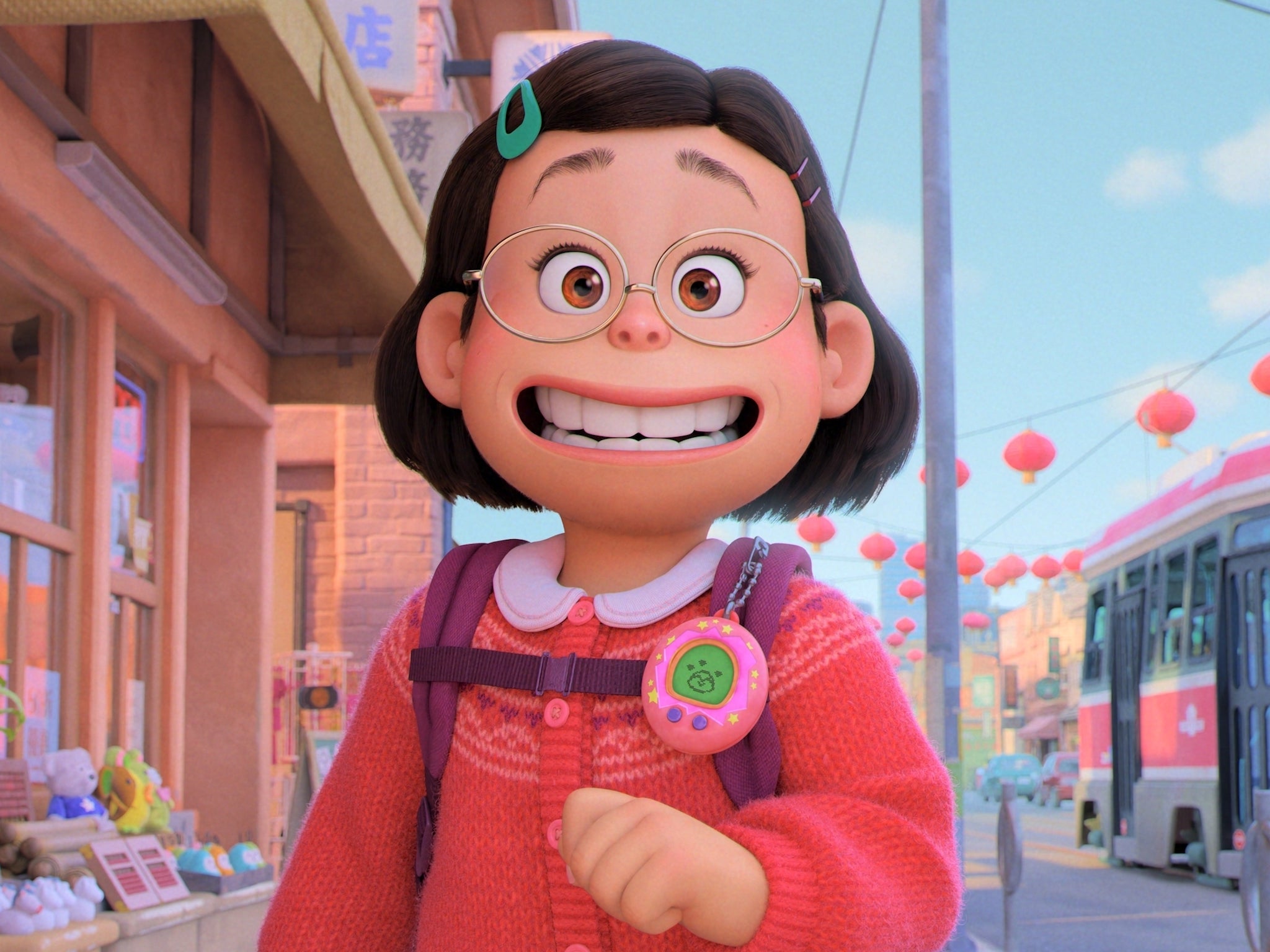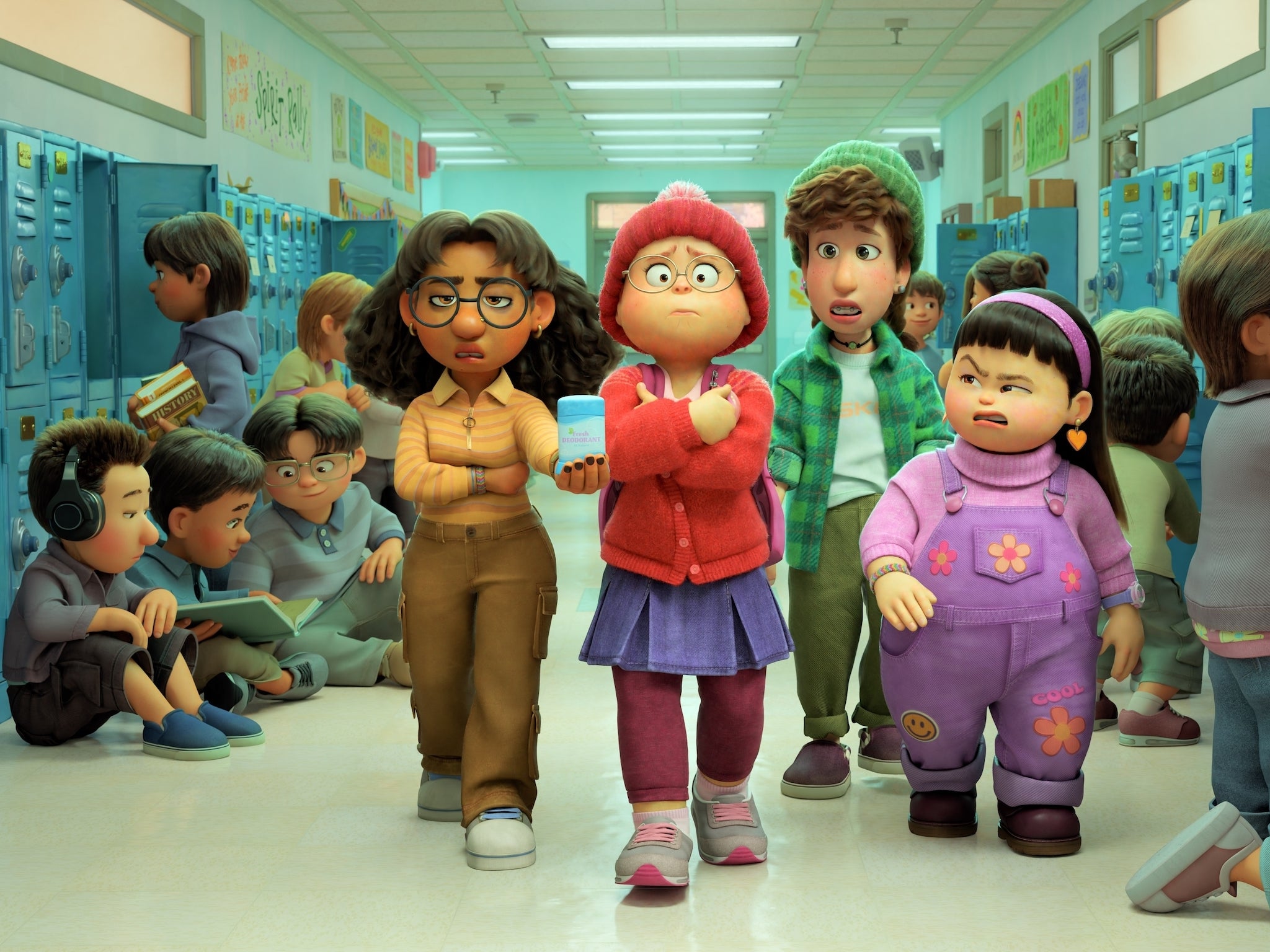‘This is the first all-women team in Pixar’s history’: The cast and creators of coming-of-age fantasy Turning Red
The film’s voice stars – Sandra Oh and Rosalie Chiang – and its creators talk to Clarisse Loughrey about smashing taboos around puberty, finding your voice, and working with Billie Eilish on the soundtrack


Your support helps us to tell the story
From reproductive rights to climate change to Big Tech, The Independent is on the ground when the story is developing. Whether it's investigating the financials of Elon Musk's pro-Trump PAC or producing our latest documentary, 'The A Word', which shines a light on the American women fighting for reproductive rights, we know how important it is to parse out the facts from the messaging.
At such a critical moment in US history, we need reporters on the ground. Your donation allows us to keep sending journalists to speak to both sides of the story.
The Independent is trusted by Americans across the entire political spectrum. And unlike many other quality news outlets, we choose not to lock Americans out of our reporting and analysis with paywalls. We believe quality journalism should be available to everyone, paid for by those who can afford it.
Your support makes all the difference.I’m trying to describe a scene from Turning Red to its director, Domee Shi, and its producer, Lindsey Collins. It features the film’s 13-year-old hero Mei, who finds herself possessed by a sudden urge while thinking about the cute boy who works at their local convenience store. She dives underneath her bed. She grabs her notebook. And she starts to draw picture after picture of the boy, his muscled arms wrapped around her and stars in his eyes. She’s in the midst of… now what I would call that?
Shi helpfully cuts in: “a horny spiral?”
Yes, a horny spiral. Pixar’s latest film, set in early-Noughties Toronto, feels a little like the dictionary of girlhood. The animated feature has an unexpected metaphor for puberty at its core: Meilin Lee, who goes by Mei, wakes up one morning to discover that whenever her emotions ride high, she’ll suddenly poof up into a giant red panda.
We’re used to metaphors when it comes to Pixar: Woody and Buzz are really just representations of all our withered childhoods; Wall-E warns us that unchecked consumerism leads to depersonalisation and isolation; Inside Out turns our own emotions into anthropomorphic characters. But Turning Red is remarkable – a landmark in Pixar’s history – for what it doesn’t leave for the future college essayists to pore over. It’s upfront about puberty, about how smelly and ungainly Mei suddenly feels. And it’s upfront about menstruation, with Mei’s mother, Ming, misreading her daughter’s sudden panic as the sign of a first period. She bursts into the bathroom, her arms filled with packs of tampons and sanitary pads. Sanitary pads! In a Disney movie! It feels like a small miracle. “Sometimes puberty is treated as a taboo subject,” Rosalie Chiang, who voices Mei, says over Zoom. “In reality, everyone goes through that – every single person.” Finally, we’re getting a Pixar film that reflects the full scope of that reality. “It’s normalised,” adds Sandra Oh, the voice of Ming, “and even in its confusing way, I think, celebrated.”
Did Shi worry about the potential pushback? “I was more curious how people would react,” she says. “Those scenes were there from, like, the very first version of the movie. It just felt like the truth – and I like to run straight into that versus tiptoeing around it.” In Collins’s words, Shi is someone who likes to “always embrace the awkward moment”. And that comes across beautifully in Turning Red, which is as full of nerves and giddiness. You could say Shi had already “embraced the awkward moment” with her directorial debut, 2018’s short Bao, which ends with a mother eating the sentient dumpling son she just raised because she’s too afraid to let him go. Slotted in before Incredibles 2, it was funny and strange in ways Pixar had never dared to be before. It won her the Academy Award. And opened the door to Turning Red.
“Pixar had approached me and asked if I wanted to develop three ideas for a feature film,” she explains. “And I knew immediately that all three of my ideas were going to be coming of age stories revolving around girls, because that was just a story that I was really passionate about. Turning Red was the most personal, I think, out of all three.” For Collins, Pixar has always been in the business of telling personal stories – and that’s been especially true of each director’s debut. When Pixar’s current head, Pete Docter, originally pitched Monsters Inc, it encapsulated all his anxieties about being a new dad.
Shi, like Mei, was born in the late Eighties – in Chongqing, in southwestern China. Her family moved to Canada when she was two years old. Pixar’s last film, Luca, was inspired by the idyllic Genoan summers enjoyed by its Italian-American director, Enrico Casarosa (except with sea monsters). Onward was about the loss of director Dan Scanlon’s father at an early age (except with elves). “I think this is what we’re seeing now: that next generation of filmmakers coming up and telling their seminal, most personal stories,” Collins says. “In some ways, I feel like it harks back a couple of decades. But in other ways, it feels very fresh, because the storytellers that are at the forefront now are very different, one to the next. So, it’s weird. It’s kind of like old school and new school combined.”

Part of that new school thinking, certainly, is the all-woman leadership team behind Turning Red. It’s the first time it’s happened in Pixar’s history. “The majority of my work has been with women – women helming, women writing, women producing,” Oh says, with a nod to past projects such as Grey’s Anatomy and Killing Eve. “The proof will be in how this movie is seen and received. Because it was women at the top of their game, given the opportunity to take the leadership in storytelling. And there’s diversity in that. And there’s a cultural diversity in that. And it’s just, like, here’s our story. Here’s what we wanted to say.”
But it’s not always so easy when you’re not accustomed to being handed the mic. For some of the team, it was the very first time they’d stepped up to the helm of Pixar’s ship. One day, Collins pulled aside the film’s production designer, Rona Liu. She’d been noticeably quiet in the Zoom meetings. Don’t be afraid to speak up, Collins told her. Your voice is wanted. Your place is earned. “I was, like, ‘Are you kidding me? You guys are the most impressive group of women I’ve ever worked with,’” says the producer. “‘Talk, because I want to hear what you have to say.’”
Shi never had that issue – she says this with the light, mischievous laugh that accompanies most descriptions of her working methods – though she admits she “had problems with my delivery”. Another laugh. “But I worked that out.” Collins elaborates: “That’s a standard thing with directors because I think, the first time you do it, you forget how impactful your voice is. You don’t realise you have 250 people hanging on to your every word, where you’re responsible for making them feel confident. And there’s a real responsibility to it.”

Watch Apple TV+ free for 7 days
New subscribers only. £8.99/mo. after free trial. Plan auto-renews until cancelled

Watch Apple TV+ free for 7 days
New subscribers only. £8.99/mo. after free trial. Plan auto-renews until cancelled
One thing’s for certain, Shi certainly knew how to coax out the most suppressed, visceral memories of her co-workers’ tween years. “I think we, as people, try to avoid that time or talking about that time, or like looking at photos of that time, period,” Collins says. “And I think, for Domi, that was like the drug. Oh, everybody hates talking about it. Let’s make a whole movie about it.” Turning Red feels like flipping through a diary – not only when it comes to the messiness of puberty or the sanctity of early friendships (Mei’s little gang is truly enviable), but the way that parent-child relationships can fluctuate over time.

“You have to start feeling alienated from your parent,” says Oh. “No matter how much you love them.” Mei has spent most of her childhood in a state of absolute fealty to her mother – out of love, of course, but also partially out of the traditions of her Chinese heritage. That changes as she grows older and starts to form a better sense of herself as an individual. “If you want to become a person of your own, you really need to go through that experience,” Oh adds. “So here we have it in a specific cultural setting, but it speaks to everyone where it’s, like, ‘I cannot turn to you, mom. I don’t know what’s happening, but I can’t turn to the person who I’ve always been turning to.’”
Turning Red may be firmly embedded in the world of Tamagotchis, teen magazines, and Baby-G watches – but it’s not so warped by nostalgia that it’s a walking artefact. Collins has three teenagers of her own. “We’re always playing music in the kitchen,” she says. “And Billie Eilish’s song ‘Ocean Eyes’, which was in, like, 2016 I think, was being played constantly. And you could just see it spoke to them. Even if they were singing low, under their breath – all of them knew the words. She spoke to this generation of kids.” So when it came down to the question of who should write the songs for Turning Red’s fictional boy band 4*Town, Collins didn’t see the point of Pixar flexing their muscle just to reunite the Backstreet Boys or ’NSync. Eilish would do perfectly. She and her brother/songwriting partner, Finneas O’Connell, have contributed three songs to the soundtrack.
And, sure, things are different today. “I think, with social media, there can definitely be some hidden things in it, like hidden insecurities, because you share what you want to share – the side you want to see,” says Chiang, who was 12 when she first started working on Turning Red. “And with Mei and her red panda, she can’t avoid that everyone is seeing the side she wants to hide.” But it still all comes down to the same fears and insecurities, to that universal code that Shi set out to write. “I hope teenagers realise that embracing your messy side is OK,” Chiang adds. “It’s perfectly normal. There’s nothing weird about it.”
‘Turning Red’ is available to watch on Disney Plus on 11 March



Join our commenting forum
Join thought-provoking conversations, follow other Independent readers and see their replies
Comments